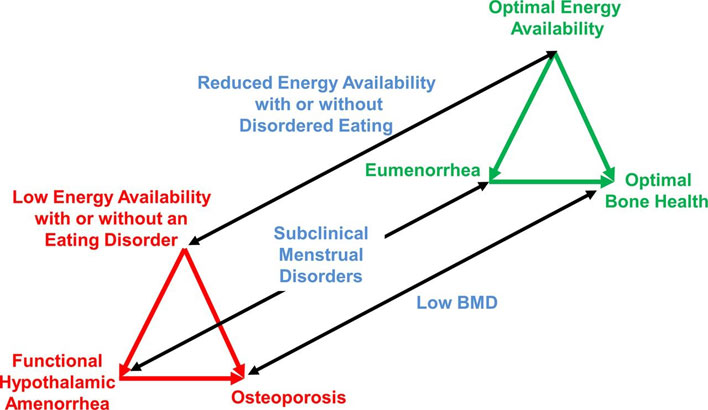USA Swimming News
Energy-Dense and Healthy Food Choices for Swimmers

by Chris Rosenbloom, PhD, RDN
Those in the sports world have probably seen the New York Times opinion piece by a 23-year old runner, who at the age of 17 was the fastest girl in America. But then her body broke down as her coaches demanded she be thinner and thinner until she developed an eating disorder. Her athletic career was derailed as she developed amenorrhea (lack of normal menstrual cycles) and broken bones from low bone density. Many other female athletes have come forward saying that girls and young women are forced to meet an athletic standard for training, body composition, and weight based on how boys and men develop.
There is a new understanding of the causes of what in the past we called the Female Athlete Triad; the longstanding thought was that disordered eating led to menstrual dysfunction which led to poor bone health. Research now shows that the underpinning of that syndrome is dietary energy intake…. or in other words, having enough energy (calories) to support growth and development and the added energy cost of exercise, including training and competition. The old notion of a triad has been expanded to consider on a spectrum.

Many young swimmers are caught in a desire to eat healthy, eat “clean,” and adopt a plant-based diet, worthy goals to be sure. However, ensuring that enough calories are eaten throughout the day can be challenging when school, training, social activities, and family life get in the way of planning meals and snacks. Without enough calories from food, physiological functions can go awry including metabolic rate, menstrual function, bone health, immune function, protein synthesis, and psychological health.
Parents are often the gatekeepers for young swimmers, so balancing healthy foods with enough calories can be a challenge. Here are some suggestions for energy-dense and healthy food choices for swimmers:
- Whole milk and full-fat yogurt with added nuts and dried fruits
- Granola cereal
- Muesli
- Oatmeal topped with brown sugar and nuts
- Overnight oats
- Blueberry pancakes with real maple syrup
- Hummus and pita chips
- Bean and cheese burritos
- Pasta with marina or pesto or meat sauce
- Chips and salsa
- Mayonnaise-based salads (tuna, chicken, egg, pasta)
- Olives
- Peanut butter or Almond butter
- Trail mix with dried fruit, nuts, and chocolate chips
- Grain-based salads
- Potatoes…baked, mashed, roasted, salad
- Rice….brown or enriched white rice
- Nuts of all kinds, including peanuts
- Cheese as a topping or a snack with crackers
- 100% fruit juice, like orange, blueberry, pomegranate, mixed berry
- Energy bars made with oats, nuts, seeds, or nut butters
- For those who eat meat, lean beef, poultry, and pork are all nutrient-rich. And, don’t forget about fish and shellfish for quality protein. Lots of people don’t think they like fish, so introduce mild-tasting fish, like tilapia or Pollock in fish grilled with blackening seasoning, served as tacos.
- For vegetarians, try soy in all the many varieties including the frozen “chicken” products. I like Morning Star Farms products for taste and convenience. (They are found in the frozen food section of the grocery store and are available from most online grocery ordering).
Eating healthy while getting enough energy is possible; it takes some planning with plenty of snacks. To determine individual energy needs for young swimmers, a registered dietitian who specializes in sports nutrition is your best resource.
Christine Rosenbloom is a registered dietitian, sports nutritionists, and nutrition professor emerita at Georgia State University. She welcomes questions from swimmers, parents, and coaches at chrisrosenbloom@gmail.com.
